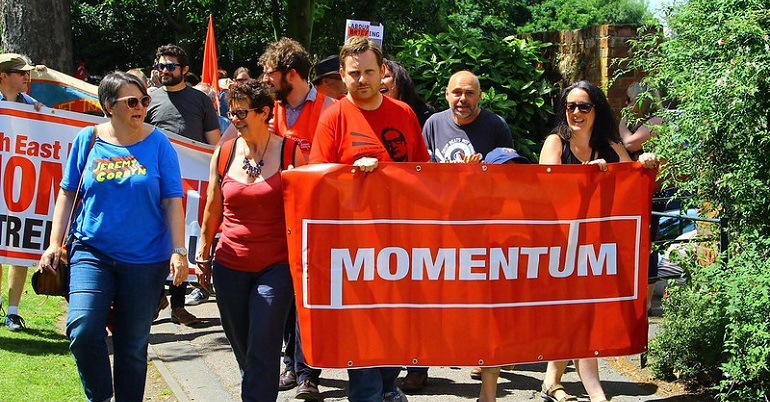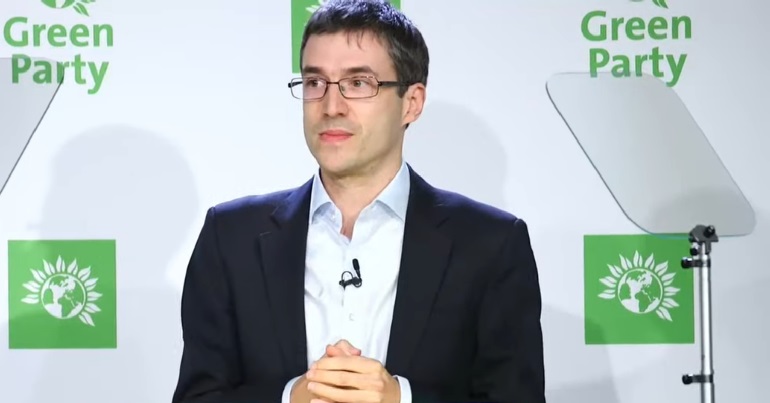Adding Momentum to the Hot Strike Summer!

Democracy is central to left politics. Socialism’s very aim is to maximise people’s freedom through the democratic control over the conditions of their lives. Democracy is the aim but it’s also the means. Socialist transformation will require hundreds of thousands, and ultimately millions, of people coordinating democratically to exercise their power. We must begin that task in the here and now. Giving people the opportunity to experience real democracy, increasing their capacities and confidence. That means democracy in left organisations is also essential. It can be useful too.
The current elections for Momentum’s governing body – its ‘National Coordinating Group’ (NCG) have understandably been less high profile than the previous time they were held.
The last few years have been difficult ones for the UK left. The trauma of Corbyn’s defeat has been compounded by the Labour right’s anti-democratic drive to isolate the left and push it out of the party. At the same time, pandemic lockdown rules restricted the left’s traditional repertoires of street tactics, delaying the recomposition it so desperately needs.
Nonetheless, the NCG election has provoked a useful discussion about the role Momentum should play in the wider left eco-system. Two main slates have emerged. Your Momentum and Momentum Organisers.
Your Momentum is a direct continuation of ‘Forward Momentum’ – the group that was elected to lead the Momentum NCG in 2020 with a programme to increase internal democracy and to encourage members to become more active in workplace and community struggles, alongside internal Labour Party work. This programme was borne of the belief that Momentum members had been shut out of decision making by the previous leadership and that Labour’s defeat at the 2019 General Election was a consequence of the weakness of the socialist and labour movement outside parliament.
The thrust of Momentum Organisers’ argument is that over the last two years Momentum has been too inward looking and spread itself too thinly, which has resulted in the organisation losing power within the Labour Party. This argument appears to pick up where the ‘Momentum Renewal’ slate that was defeated in 2020 left off, which is unsurprising as there is also some continuity between those involved in that campaign and Momentum Organisers.
The suggested solution therefore is that Momentum should retrench and focus more on Labour Party organising. This is a reasonable and legitimate position to take, but I happen to disagree with it.
The crises that opened the path to the left’s resurgence in 2015 have intensified and worsened. The current cost of living crisis is pushing millions beyond what they can tolerate. With no answers from the right or centre this cost-of-living crisis has seen the left regain the initiative and class struggle move to the centre of attention. We’re currently looking at a Hot Strike Summer and with no prospect of relief from the crisis this is just the beginning of a prolonged period of extra-parliamentary class action.
What role should Momentum play in such a period? First and foremost, it must help create socialists. Millions will be engaged by the forthcoming strikes, protests, and direct action. Momentum must provide avenues through which that anger can become identification with the left. It must help people fill in the dots and reach a systemic understanding of the position they are in. It must help move people from sympathisers to activists, connecting them up with others.
Momentum already has many of the structures to play this role, put in place by the current NCG. The Leo Panitch leadership programme is a great example of cadre building education. The Momentum trade union network and climate justice programme are another example of initiatives that could really scale in the right conditions. The aim isn’t to replicate the work of others but to facilitate it by filling the gaps in the movement’s eco-system. When people talk about Momentum acting as a bridge to the unions and social movements, this is what they mean.
Diverting all Momentum’s focus to ‘organising’ inside the Labour Party during a moment of rising class struggle could be a huge, missed opportunity. It risks a retreat into irrelevance as we fail to keep up with a changing terrain. Even on its own terms it’s unclear how it could work as the path to left control of the NEC lays as much outside the Labour Party’s structures as within them. It can’t be done without left control of the unions and their seats on the NEC.
The recent victory of the left slate in the Unison NEC elections is absolutely key. This work has been supported by Momentum and the Unison vice president, Amerit Rait, is standing on the Your Momentum slate. But more than this, why would people engage with organising within Labour Party structures absent a bridge to the political energy being created elsewhere? To win over Labour Party members and regain hegemony within the party the left must show it has a better grip on the crises facing us and a viable plan of action to address them.
With only three of the current NCG members restanding for election, a fresh set of candidates have been elected to the Your Momentum slate through a primary process. In many ways, the candidates standing are a product of structures and policies put in place by the current NCG. Many are veterans of the training programmes or initiatives which Momentum has developed. Others have been engaged by the Momentum refounding and democratisation process. The strength of the slate is a testament to the way that democratic engagement, coordination and training programmes can produce new cadre and leaders.
There are no quick fixes for the left. No easy answers. Invoking the word ‘organising’ is no panacea. On the other hand, invoking the word democracy is no panacea either. But far from being a distraction the drive to increase democratic engagement is what marks the left project off from the wave of anti-democratic sentiment and practice gripping both the right and the centre. If we want to democratise the country and the economy, then we’ll need to democratise our institutions. Outside a change in electoral system that means democratising the Labour Party. That’s why democratising Momentum was so important. The form and content of the democratic socialist message needs to be coherent and easily understandable. That’s why I’m backing the Your Momentum slate.
Keir Milburn is writer and researcher based in the North of England. He’s the author of Generation Left and co-host of the #ACFM podcast.
PS. We hope you enjoyed this article. Bright Green has got big plans for the future to publish many more articles like this. You can help make that happen. Please donate to Bright Green now.




Leave a Reply